I have a header and .cpp file. I am having difficulty initializing the array. The problem is that I can't specify the array size. The size depends on the number of elements the user inputs. When I make a new dynamicArray, I believe I have to use the "new" like dynamicArray = new string[sizeof(array)] (because I have to delete the memory later according to the assignment) but when I run it through Linux, it says that it cannot appear in a constant - expression.
I'm still a little unfamiliar with C++. Any feedback is appreciated.
What the error looks like:
I also had issues with the header redefinition and I think the #pragma once helped. I know #include "stdafx.h" is bad for linux. I remove it every time I run it on linux.
DynamaicStringArray.cpp
// DynamicStringArray.cpp : Defines the entry point for the console application.
//
#include "stdafx.h"
#include "DynamicStringArray.h"
#include "Assignment9Test_V1.cpp"
// copy constructor that copies the array
DynamicStringArray::DynamicStringArray(string array[]) {
// string *dynamicArray = new string[sizeof(array)]; // without pointer, error with conversion between types
dynamicArray = new string[sizeof(array)];
for (int i = 0; i < sizeof(array); i++) {
dynamicArray[i] = array[i];
}
}
// default constructor
DynamicStringArray::DynamicStringArray() {
size = 0;
dynamicArray = NULL;
// dynamicArray = new string[size];
}
// frees up dynamic array memory
void DynamicStringArray::destructor(string array[]) {
delete[] array;
array = NULL;
}
// return number of entries in array
int DynamicStringArray::getSize() {
return size;
}
// creates a new dynamic array one element larger than dynamicArray
// copies all elements of dynamicArray to new array and
// add new string to end of new array
// increment size
// delete old dynamicArray
// set new array as dynamicArray
void DynamicStringArray::addEntry(string newString) {
string *newArray;
newArray = new string[size + 1];
for (int i = 0; i < size; i++) {
newArray[i] == dynamicArray[i];
}
int endIndex = sizeof(newArray);
newArray[endIndex] = newString;
destructor(dynamicArray);
dynamicArray = newArray;
}
// searches for dynamicArray for specific string,
// if string not found, return false
// if string is found, create new one size smaller dynamic array
// than dynamicArray
// copy elements of old dynamicArray to new array without the string
// delete old dynamicArray
// decrement size
// return true
bool DynamicStringArray::deleteEntry(string deleteMe) {
string *newArray;
newArray = new string[size - 1];
bool isFound = false;
for (int i = 0; i < size; i++) {
if (dynamicArray[i] == deleteMe) {
i++;
isFound = true;
}
else if (dynamicArray[i] != deleteMe) {
newArray[i] == dynamicArray[i];
}
}
if (isFound) {
return true;
destructor(dynamicArray);
dynamicArray = newArray;
}
else if (!isFound) {
return false;
}
}
// returns the string at that index
string DynamicStringArray::getEntry(int findMe) {
return dynamicArray[findMe];
}
DynamicStringArray.h
#pragma once
#include <string>
#include <iostream>
using namespace std;
class DynamicStringArray {
public:
DynamicStringArray();
DynamicStringArray(string array[]);
// overloading the assignment operator
void destructor(string array[]);
int getSize();
void addEntry(string);
bool deleteEntry(string);
string getEntry(int);
private:
int size; // holds number of entries in the array
string *dynamicArray; // references a dynamic array of type string
};
